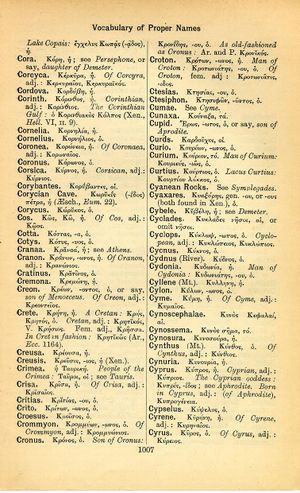Cypselus: Difference between revisions
νεκρὸν ἐάν ποτ' ἴδηις καὶ μνήματα κωφὰ παράγηις κοινὸν ἔσοπτρον ὁρᾶις· ὁ θανὼν οὕτως προσεδόκα → whenever you see a body dead, or pass by silent tombs, you look into the mirror of all men's destiny: the dead man expected nothing else | if you ever see a corpse or walk by quiet graves, that's when you look into the mirror we all share: the dead expected this
m (Text replacement - "link={{" to "link={{") |
m (Text replacement - "(|thumb)\n(\|link=)" to "$1$2") |
||
| Line 1: | Line 1: | ||
{{WoodhouseENELnames | {{WoodhouseENELnames | ||
|Text=[[File:woodhouse_1007.jpg|thumb | |Text=[[File:woodhouse_1007.jpg|thumb|link={{filepath:woodhouse_1007.jpg}}]]Κύψελος, ὁ. | ||
|link={{filepath:woodhouse_1007.jpg}}]]Κύψελος, ὁ. | |||
}} | }} | ||
{{Lewis | {{Lewis | ||
Revision as of 16:45, 18 May 2020
English > Greek (Woodhouse)
Κύψελος, ὁ.
Latin > English (Lewis & Short)
Cypsĕlus: i, m., = Κύψελος,
I a tyrant at Corinth, Cic. Tusc. 5, 37, 109.—Hence,
II Cypsĕlĭdes, ae, m., = Κυψελίδης, the descendant of Cypselus, i. e. Periander, Verg. Cir. 463.
Latin > French (Gaffiot 2016)
(2) Cypsĕlus, ī, m., tyran de Corinthe : Cic. Tusc. 5, 109 || -ĭdēs, æ, m., fils de Cypselus, Périandre : Virg. Cir. 464.
Latin > German (Georges)
(1) Cypselus1, ī, m. (Κύψελος), ein berühmter Tyrann zu Korinth, Cic. Tusc. 4, 109. – Davon Cypselidēs, ae, m. (Κυψελίδης), der Nachkomme des Cypselus, d.i. Periander, Ps. Verg. Cir. 463 (464).

